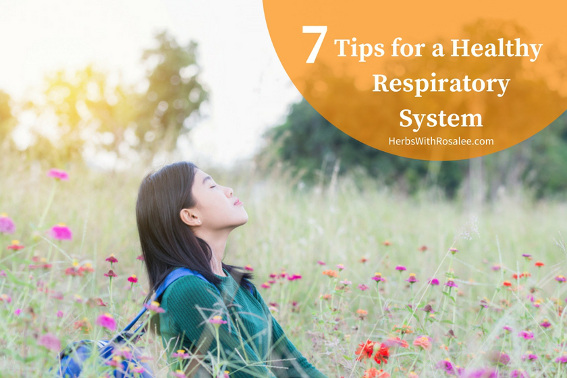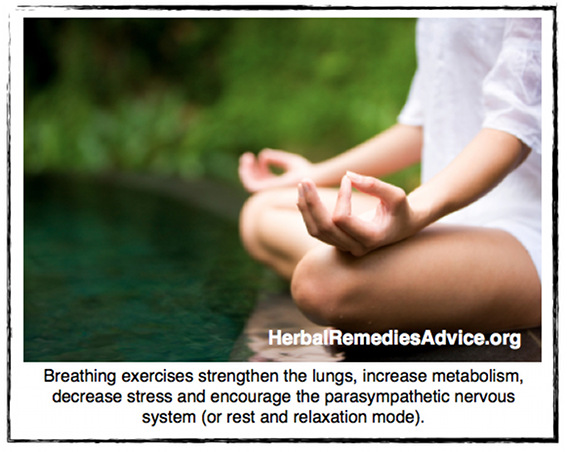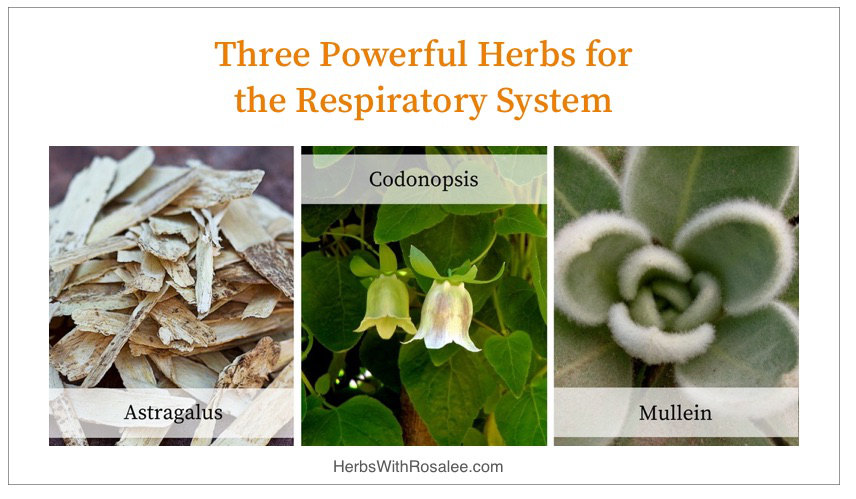Get weekly tips, recipes, and my Herbal Jumpstart e-course! Sign up for free today.

Respiratory System
Share this! |
|
|
Your respiratory system gives you the gift of life! As you well know, you couldn’t survive without the ability to breathe for more than a couple of minutes. Besides fulfilling this basic need, this system oxygenates your entire body and is one of the most powerful detox organs in the body. |
Seasonal allergies, frequent colds and flu, asthma and recurring sinusitis are common problems found in this system. The following tips can help you maintain, or provide a starting point to heal, your respiratory system.
See the following linked article for more information about the anatomy and physiology of the respiratory system.
1. Breathe in Good Air
Many cultures, both past and present, have recognized the value of breathing exercises. Yoga calls this pranayama. Qi Gong is sometimes translated simply as “breath work.”
Breathing exercises strengthen the lungs, increase metabolism, decrease stress and encourage the parasympathetic nervous system (or rest and relaxation mode).
Dr. Carl Stough (nicknamed Dr. Breath) famously helped emphysema patients who could barely breathe simply through breath work. His techniques are fascinating!
If you’ve ever had an extremely stressful moment that you’ve been able to overcome with your breath, you know how effective mindful breathing can be in the moment.
2. The Princess Organ
In Traditional Chinese Medicine, the lungs are referred to as the princess organ or the delicate organ. This is because they are considered to be susceptible to outside influence. As a result, the lungs like things just right so treat them well!
External influences that can damage the lungs include too much dryness, chemical pollution, particles (like breathing in a lot of dust, sand, mold, etc) and cold air.
If you live or work in an environment not well-suited to the health of your lungs, take strong steps to ameliorate the situation. If you live in an exceptionally dry environment, try using a humidifier. If you are around airborne particles, wear a mask. Do you best to avoid chemical pollution such as smog from cities or harsh cleansing products.
3. Is Dairy Right for You?
Some people are able to easily digest dairy products. For them, dairy becomes a healthy source of protein, calcium and, if fermented, healthy gut flora. For others, however, dairy can be the source of many problems.
I don’t think it’s warranted to say dairy is bad for the lungs, but I have seen many people with chronic problems in the respiratory tract (such as sinusitis and asthma) improve their symptoms after they stopped eating dairy.
If you have chronic respiratory problems and you consume a lot of dairy, try eliminating dairy for six weeks and note changes in your health. Changes can happen slowly, so pay attention.
Dairy is a cold and damp food. It is often not appropriate to eat dairy when dealing with cold and damp conditions such as upper respiratory infections, congested mucus, etc.
4. Herbs for Respiratory System
There are many herbs for this system. Some herbs are specific for conditions such as infections or asthma. You can see some herbs for allergies in this article.
Here are a few herbs that are good for respiratory system tonic healing, meaning they strengthen the overall health of the lungs.
Astragalus (Astragalus membranaceus)
Astragalus is one of my favorite lung tonics. This root, originally from China, helps to strengthen the lungs and the immune system. I frequently consider this herb for people who are often getting sick.
Codonopsis (Codonopsis pilulosa)
Codonopsis, sometimes called “poor man’s ginseng”, is another tonic root from China. This herb nourishes the blood and strengthens the lungs. It works well for people who feel worn down and constantly tired.
Mullein (Verbascum thapsus)
Mullein is a traditional western herb for strengthening and healing the lungs. It can be taken as a tea that is strained well.
5. Let Go of Grief
In Traditional Chinese Medicine, excessive grief harms the lungs. Before you dismiss that as woowoo I’d like you to imagine something with me.
Have you felt grief? How about crushingly devastating grief such as the loss of a loved one? Can you remember how that felt? As I conjure up those feelings for myself I feel the pain of grief and loss in my lungs.
Of course grieving is natural and healthy. It’s when grief becomes prolonged and excessive that it harms the health of the lungs. If you are holding on to grief, consider giving yourself the gift of time with a counselor or finding some ways to work through the grief.
6. Exercise
We know exercise is good for the heart, but it also improves the lungs! While exercise doesn’t seem to make a huge difference in lung capacity, it does help to make the exchange of gases during exercise a more efficient function, thus supporting cardio output.
When exercising outside be sure to do it in an area that is free of chemical pollution. (Hint: jogging alongside a busy road is not a great idea for lung health.)
7. House Plants
If you spend a lot of time indoors, whether at your home or at work, consider getting house plants. Many house plants are easy to grow and, in return, they filter out the air in your environment.
There are many different house plants that are easily available. I particularly love spider plants, philodendron plants and jade trees.
Here’s a list of plants that NASA found to be especially useful for filtering air.
Summary
Breathing fresh air, using herbs for the respiratory system, getting regular exercise and using breathing techniques such as pranayama will go a long way in supporting the health of your entire respiratory system.
One of the most common complaints of the respiratory system is seasonal allergies. Read about natural solutions for seasonal allergies by clicking the link below.
Respiratory System Diseases

Rosalee is an herbalist and author of the bestselling book Alchemy of Herbs: Transform Everyday Ingredients Into Foods & Remedies That Healand co-author of the bestselling book Wild Remedies: How to Forage Healing Foods and Craft Your Own Herbal Medicine. She's a registered herbalist with the American Herbalist Guild and has taught thousands of students through her online courses. Read about how Rosalee went from having a terminal illness to being a bestselling author in her full story here.


